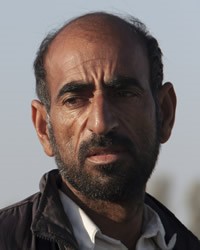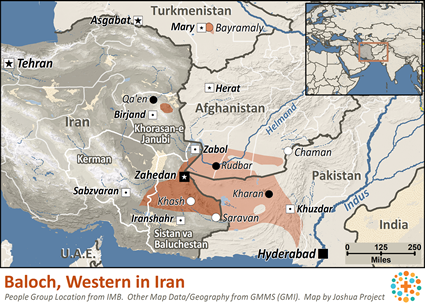The Western Baloch are part of a much larger population of Baloch numbering several million. Their homeland straddles the borders of Iran and Pakistan, with a majority living in Pakistan. About half of those in Iran live in cities, while the others are semi-nomadic shepherds.
The various Baloch subgroups speak different languages, each with distinguishing characteristics. These languages have been divided into three groups: Eastern, Western, and Southern Balochi.
Their name, " Baloch," is shrouded in controversy. Some say it means "nomad," while others claim that it is an old Persian word meaning "the cock's crest." Their history is just as mysterious. Some have traced their origins to Nimrod, son of Cush (Noah's grandson). But while some things are uncertain, we do know that they first moved to the region in the twelfth century. During the Moghul period, this territory became known as "Balochistan."
The Western Baloch have been isolated for many years due to Iran's harsh climate, the difficulty of communicating, and their former reputation as bandits. The governments of Iran, Afghanistan and Pakistan have built roads and developing agriculture programs. However, the Western Baloch have remained largely unaffected by these developmental changes. Perhaps for this reason and others, there is an active effort of Baloch rebels who stand against the Iranian government.
The Western Baloch are basically self-sufficient, relying on their own skills to build homes and develop the tools necessary for daily life. Their economy is based on a combination of farming and semi-nomadic shepherding. They usually raise sheep, cattle, or goats. Agriculture is limited because of the harsh climate; nevertheless, it plays a large role in the economy. The chief crop is wheat. To aid in the household economy, some farmers raise chickens. They also depend on wild fruits and vegetables. One wild plant, called the dwarf palm, is used as a dietary supplement. They eat the meat of the palm and use the leaves to make ropes, shoes, mats, and tents. Though their survival techniques may vary, each community tries to keep a wide variety of animals and grow many different crops. If the local economy does not provide adequate job opportunities, the young men often move to the cities in search of work.
Baloch societies are patriarchal, or male dominated. They are organized into kin-based clans and territorially defined tribes. Male elders are the heads of these tribal units. Within the family, the entire household is responsible for tending the family's herd. Women work in groups, threshing and separating the harvest, while plowing and planting are done by the men. Traditionally, land is not privately owned but belongs to the whole tribe.
Western Baloch marriages are arranged between the bride's father and the prospective groom. A bride price of livestock and cash is paid. Once a woman is married, she passes from the authority of her father to that of her husband. Marriages are monogamous and lifelong, and marrying a non- Baloch is strictly forbidden.
Balochmayar is the honor code by which the Western Baloch live. These principles include extending hospitality and mercy, dealing with each other honestly and offering refuge to strangers. They are preserved through both songs and poetry. Children learn proper behavior by watching their elders and are taunted whenever they misbehave.
Prior to the coming of Islam, the Western Baloch were probably Zoroastrians. Today, they are Sunni Muslims. They differ with the Iranian government which is Shia Muslim.
The Western Baloch of Iran have few opportunities to hear of the only savior. How will they hear without a messenger of good news?
Ask the Lord to call those who are willing to go to Iran and share Christ with the Western Baloch.
Pray for Western Baloch elders and family leaders to have dreams of the risen and victorious Christ.
Pray that God will open the hearts of Iranian governmental leaders to the gospel.
Ask the Lord to raise up Western Baloch disciples who will make more disciples.
Scripture Prayers for the Baloch, Western in Iran.
https://en.wikipedia.org/wiki/Baloch_people_in_Iran
https://iranprimer.usip.org/blog/2013/sep/03/iran-minorities-2-ethnic-diversity
https://iranprimer.usip.org/blog/2017/apr/05/baluch-insurgents-iran
| Profile Source: Joshua Project |

























